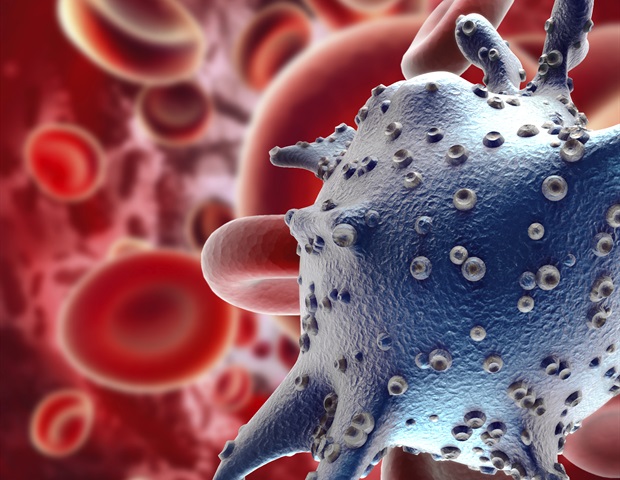
As most cancers cells develop, they pump out metabolic byproducts corresponding to lactic acid into the tumor microenvironment. Exhausted T cells -; which have misplaced their cancer-fighting oomph -; devour this lactic acid, which additional saps their vitality, based on new analysis from the College of Pittsburgh and UPMC Hillman Most cancers Heart.
When the researchers blocked the protein that imports lactic acid into cells, exhausted T cells gained a brand new lease on life, which led to improved tumor management in mouse fashions of most cancers. The findings are printed at the moment in Nature Immunology.
Blocking entry to inhibitory metabolites is a totally new tackle how we are able to reinvigorate the immune system. We regularly consider exhausted T cells being ineffective, however this examine reveals that we are able to truly get juice out of those cells by blocking unfavorable results of the tumor microenvironment.”
Greg Delgoffe, Ph.D. senior writer, professor of immunology at Pitt and director of the Tumor Microenvironment Heart at UPMC Hillman
When frequently uncovered to tumors, T cells progressively change into much less efficient resulting from expression of coinhibitory receptors that act like brakes. Progenitor exhausted T cells, which nonetheless retain some cancer-killing operate, can deteriorate additional to a terminally exhausted state. Most immunotherapies, together with the checkpoint inhibitor medication anti-PD1 and anti-CTLA4, try to launch these brakes by blocking coinhibitory receptors.
“Checkpoint inhibitors, that are the principle weapons in our immunotherapy arsenal, have been extremely profitable for some sufferers with sure cancers, however there have additionally been lots of failures, and so they have not been the gamechangers we anticipated in lots of cancers,” stated Delgoffe. “There’s solely a lot you are able to do by taking your foot off the brake.”
On the hunt for brand spanking new methods to jumpstart drained T cells, Delgoffe and first writer Ronal Peralta, Ph.D., postdoctoral fellow in Delgoffe’s lab, began by a household of proteins referred to as solute carriers, which transport vitamins into cells.
“Exhausted T cells have been studied extensively by way of what they will not do,” stated Peralta. “However what do exhausted T cells do? What do they eat? What vitamins have they got entry to? These questions have been the start line of our examine.”
Peralta discovered {that a} solute provider referred to as MCT11, which imports lactic acid, was dramatically elevated in terminally exhausted T cells in comparison with their progenitor variations, suggesting that lactic acid contributes to lack of operate.
When he deleted the gene encoding MCT11 in mice or blocked the protein with a monoclonal antibody, T cells ingested much less lactic acid and confirmed improved performance and tumor management in mouse fashions of melanoma, colorectal carcinoma and head and neck most cancers.
If coinhibitory receptors that result in T cell exhaustion are the brakes on a automotive, lactic acid is like poor high quality gasoline contaminated with filth and particulates that hinders the automobile’s efficiency. By blocking entry to the gasoline station that sells this subpar gas, the automotive accesses higher gasoline that improves its efficiency -; identical to blocking MCT11 stops T cells from accessing lactic acid that impedes their operate.
“Once we eliminate MCT11, there is no distinction within the expression of coinhibitory receptors on T cells,” defined Delgoffe. “They’re nonetheless technically exhausted, however they behave as practical T cells as a result of we lower off the faucet of this unhealthy metabolite, lactic acid.”
The researchers discovered that the MCT11 antibody promoted clearance of tumors in mice when given alone, but it surely was much more efficient when mixed with anti-PD1.
By their new spinout firm, Delgoffe and Peralta are actually working to optimize the MCT antibody for effectiveness in human T cells, with the aim of testing it in future medical trials.
In line with Peralta, MCT11 is a horny therapeutic goal as a result of it’s nearly solely expressed in exhausted T cells, that are concentrated in tumors. Which means that medication concentrating on MCT11 may have fewer unwanted side effects than conventional immunotherapies corresponding to anti-PD-1, which act on T cells all through the physique.
“This analysis is de facto thrilling as a result of it is proof-of-concept that concentrating on how T cells work together with metabolites of their setting can promote higher outcomes in most cancers,” stated Peralta. “It opens the door for exploring how we are able to go after different targets in immune cells for treating most cancers and lots of different illnesses.”
Different authors on the examine have been Bingxian Xie, Ph.D., Konstantinos Lontos, M.D., Ph.D., Hector Nieves-Rosado, Ph.D., Kellie Spahr, Supriya Joshi, Ph.D., Rhodes B. Ford, Kevin Quann, M.D., Ph.D., Andrew Frisch, Victoria Dean, Mary Philbin, Anthony R. Cillo, Ph.D., Sebastian Gingras, Ph.D., Amanda C. Poholek, Ph.D., Lawrence P. Kane, Ph.D., and Dayana B. Rivadeneira, Ph.D., all of Pitt and UPMC.
This analysis was supported by the Nationwide Institutes of Well being (DP2AI136598, P50CA121973 and P50CA097190), the Nationwide Institute of Allergy and Infectious Illness (R01AI171483, R01AI166598), the Hillman Fellows for Modern Most cancers Analysis Program, Stand As much as Most cancers (SU2C-AACR-IRG-04-16), the Alliance for Most cancers Gene Remedy, the Mark Basis for Most cancers Analysis’s Rising Chief Award, a Most cancers Analysis Institute Lloyd J. Outdated STAR Award and the Sy Holzer Endowed Immunotherapy Fund.
Supply:
Journal reference:
Peralta, R. M., et al. (2024). Dysfunction of exhausted T cells is enforced by MCT11-mediated lactate metabolism. Nature Immunology. doi.org/10.1038/s41590-024-01999-3.

